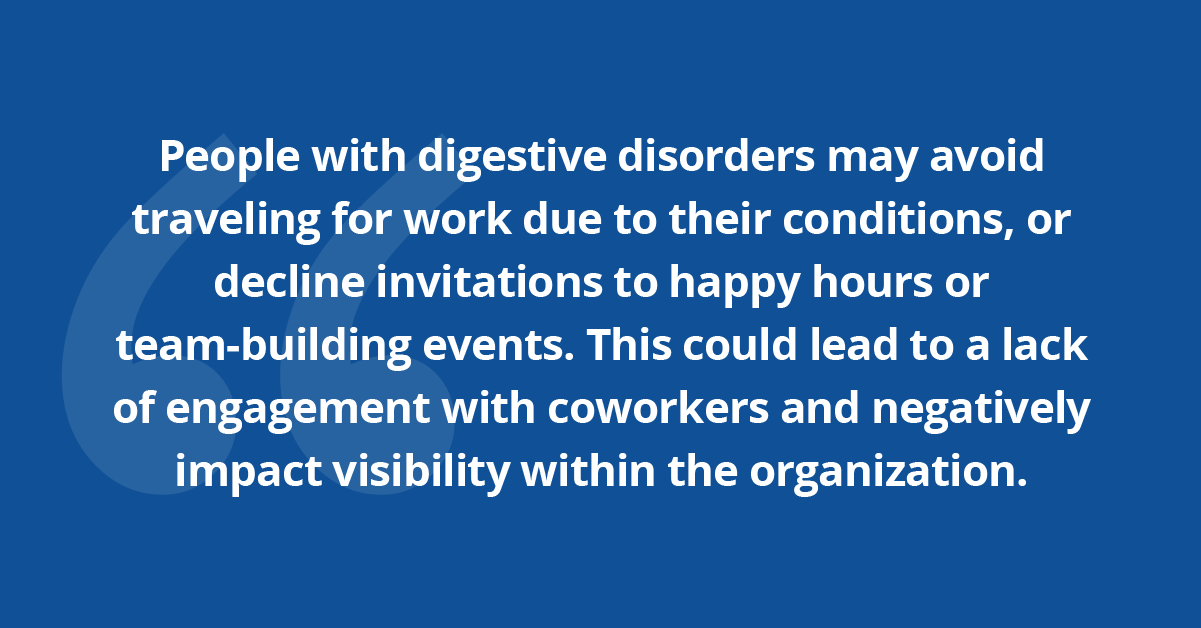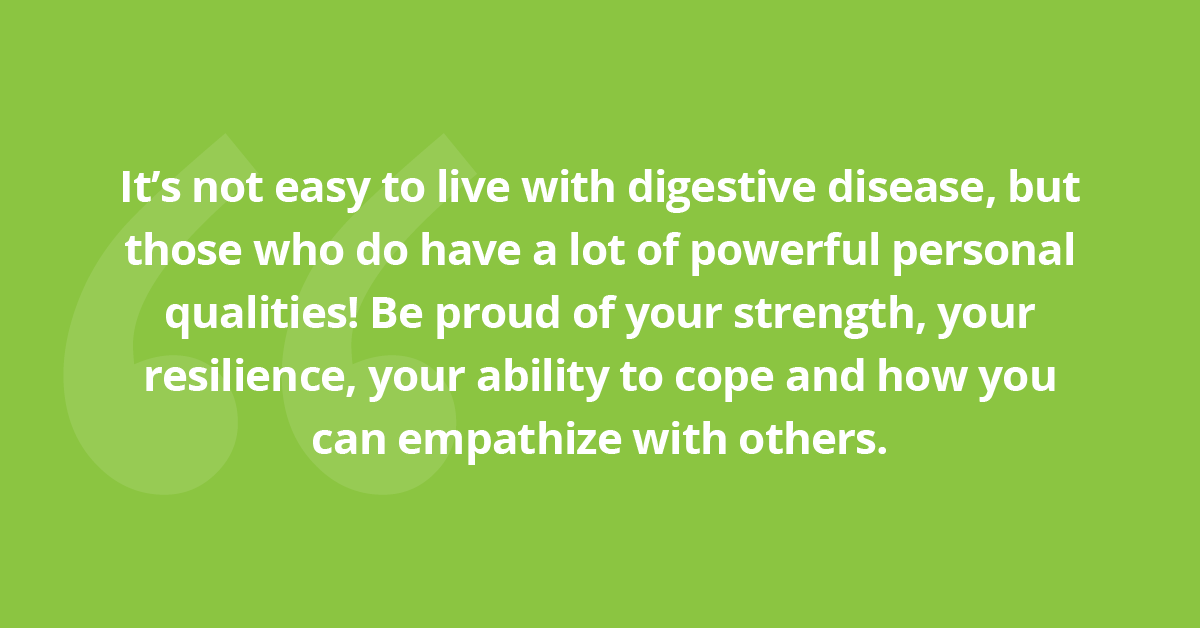When you have a digestive disease, there are challenges beyond the illness itself. Coping with painful, often embarrassing symptoms can make it hard to fully connect with other people. That means relationships can suffer. It’s a double-blow for quality of life for people with conditions like irritable bowel syndrome (IBS), inflammatory bowel disease (IBD), and other digestive problems.
Connection with others is vital for all of us. Even in the time of COVID-19 and social distancing, we need to find ways to nurture and develop relationships. Sure, it’s taking some creativity to remain close to others these days (another Zoom happy hour, anyone?) but the point is we are a social species. We’re designed to be close with other people, by nature.
What happens when you have a gut health problem that causes you to not feel all that confident about spending time with others, though? What can you do to maintain social interactions both personal and professional?
Not Feeling Very Social
Many digestive diseases are triggered or made worse by food choices. Because food is such a central part of most of our social interactions, just accepting an invite to a party or work function can be tough. Over time, you can feel uncomfortable even with trusted family members if you have food requirements in social settings. It can lead to anxiety, avoidance and possibly depression or low self-worth if it goes on long enough.
For example, here’s how it played out for an anonymous member of our GIThrive community:
“During the time of my life when my GI issues were the worst and I hadn’t yet figured out my trigger foods, it really impacted my life and my relationships with others. I would avoid eating out with my family or end up having to choose the same restaurant over and over because I knew there was one entree that I could tolerate. I also dreaded going to church potlucks or family gatherings when people would bring items to contribute to the buffet. I didn’t know how they were prepared and how my stomach would tolerate them.”
Living with a digestive problem goes beyond food. Many folks need to plan their activities around restroom access. Another GIThrive member skipped a fun family reunion at a park even though she could easily bring her own food because the rented pagoda was “located too far away from the bathrooms and I knew I could be in trouble.”
And finally, there’s the challenge of trying to be social with others when you’re just not feeling well. We’ve all had to try to “put on a happy face” for social interactions at one point or another, but those with chronic digestive issues can find that they need to push through physical pain on a regular basis. It can be stressful to “hide” symptoms and behave as though you’re not uncomfortable while at work, or while hanging out with friends. In turn, stress is a well-known trigger to making gut problems feel even worse. It’s a tough cycle to be stuck in.
Broken Connections and Intimacy Issues
When it comes to the deeper bonds that come with personal relationships, digestive disease has potential to creep in and sabotage even the happiest of friendships and romantic partnerships.
In some cases, you might not want to divulge all the details of your health condition to a partner. That’s largely because of the stigma that surrounds digestive disease. To be blunt, talking about digestion, and especially poop, is a taboo in our society. We all might feel that taboo intuitively, but Dr. Susan Staggs, a health psychologist with Vivante Health, also studies it.
“Unfortunately, digestive disorders have characteristics that make them more stigmatizing. These can be ‘invisible’ diseases, where a person might look OK but feels physically uncomfortable. They deal with chronic symptoms, relapses and they can’t avoid thinking about things like bowel movements. Sufferers are in real physical pain in addition to carrying a huge psychological burden.” (For a deeper dive on this topic, check out our free webinar Taking Stigma Out of Digestive Disease by clicking below.)
Without transparency and honesty, relationships can be plagued with misunderstandings, resentment and even anger. Friends may become distant and, as mentioned earlier, the social invitations may start to drop off if you’re repeatedly avoidant or on the sidelines.
As for romantic relationships, issues with being intimate are a real concern. It’s hard to get in a romantic mood if you’re worried about digestive symptoms making an appearance. In a recent Patient study, IBS was shown to negatively impact the romantic lives of patients for 79% of the healthcare professionals surveyed. And when you consider that not everyone will openly tell their doctors when they’re having romantic issues, it’s easy to imagine that the problem is even more widespread in real life.
Stunted Workplace Relationships
To be successful at work, we need to have strong professional relationships. That can mean being able to confidently work with the public in retail or service industries, and it certainly applies to teammate collaboration and working well with supervisors.

But when you’re feeling under the weather at work, it can have negative effects on those one-on-one connections.
Lost productivity is a significant concern. If you can’t concentrate due to pain, bloating, cramps or having to run to the office restroom frequently, your work can suffer. In turn, teammates may feel stressed if they’re waiting on the completion of your work or if they need to pick up “the slack” too often. Over time, issues of resentment could arise.
And even if you do get all your work done, from a psychological standpoint a person with digestive disease may hold themselves back from reaching their potential. Why? It’s connected to stigma again.
“Perceived stigma is when you feel others think less of you because you have a digestive condition,” says Dr. Staggs. “You may preemptively worry that your coworkers will be frustrated if you request restaurants with gluten-free options for client meetings, or you fear what they would think of you if they knew you had IBD.”
People with digestive disorders may avoid traveling for work due to their conditions, or decline invitations to happy hours or team-building events. This could lead to a lack of engagement with coworkers and negatively impact visibility within the organization. Some with digestive disorders could even miss out on promotions and new roles if they are not developing strong enough professional relationships.
What You Can Do
Given the importance of the many types of relationships in our lives, it’s crucial to take steps to head off any negative “side effects” from living with a chronic digestive disease.
The good news is that relationships themselves may have the power to help people with gut issues feel better. There’s evidence that relationships can have direct impacts on the progression of a digestive disease. As expected, supportive relationships can increase the chances that digestive disease patients may have an improved quality of life whereas poor relationships can be detrimental. All the more reason to work on creating positive relationships! Read more about these concepts in this study on the importance of relationships for people with IBS.
To help nurture the types of relationships that can boost quality of life and stay healthy both physically and emotionally, check out these insights from the International Foundation for Gastrointestinal Disorders:
- Try to identify areas of conflict in your personal relationships. Research shows that continuing to talk about problem areas—without withdrawing or blaming—results in much less personal stress, no matter how serious the issue.
- Be specific about the kinds of support you need from your significant others. Others are often misinformed about what is useful in terms of reminders, scheduling, and other restrictions.
- Explain that having a condition like yours requires you to be a kind of active researcher, always looking for what does and does not help, hurt, and work best for you. Sorting this out takes time and focus, and your efforts should be recognized and admired.
- Be aware that friends and family members may be projecting their own worries about health issues on to you. Point out where their comments seem not to apply to your health problems.

Overall, learning to communicate about your issues with honesty and clarity takes practice.
It’s not easy to live with digestive disease, but those who do have a lot of powerful personal qualities! Be proud of your strength, your resilience, your ability to cope and how you can empathize with others. A digestive disease is like any other medical condition and even though it can be a challenge to talk about it at first… like anything, practice makes a difficult thing easier over time.
It’s worth it to be yourself and learn to develop real, lasting connections both at home and at work. If you need support, please reach out. Members of GIThrive can speak with our health coaches and dietitians 24/7. Click here for details about how we work with people everyday to manage gut health and feel better.







